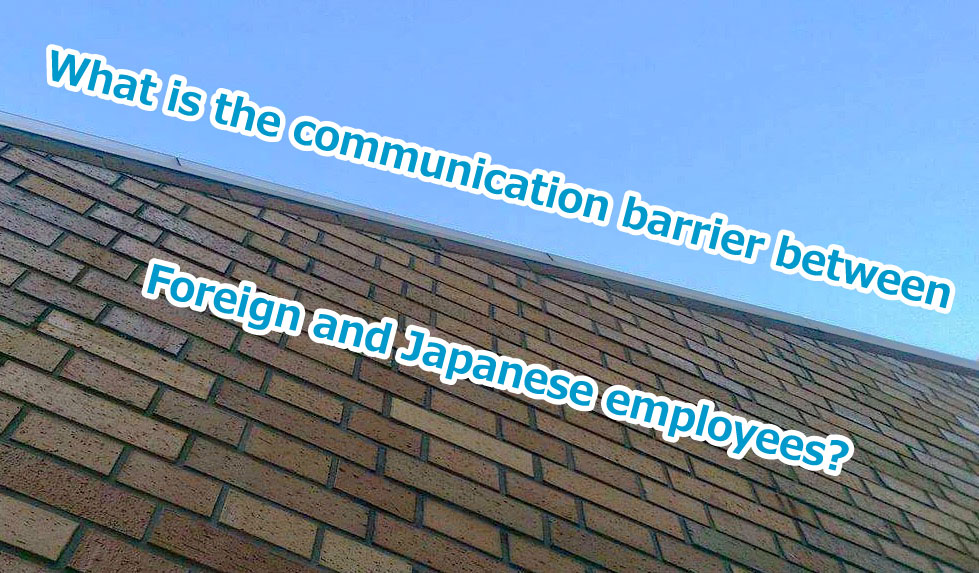
東京へ転勤しても高知の合唱団で活動を続けられる理由
ランチタイムイベント「おべんと食べよ!」を開催しました
KTC合宿 ~お互いの価値観を知る事が、関係作りの第一歩~
はじめての介護
休業・休職者の代替要員を支援する「すけだち報酬制度」を新たにスタート
2025年度の働き方 ~オフィス出社日の設定とコミュニケーション②~
2025年度の働き方 ~オフィス出社日の設定とコミュニケーション①~
新年度キックオフイベント「SPRING MEETING 2025」を開催しました
東京都の「Tokyo Career Guide 東京で働こう」にて当社が紹介されました!
「仕事」と「育児」と「介護」の両立(社員エッセーより)
What is the communication barrier between Foreign and Japanese employees?

I had a get-away trip with my high school friends (who are now living in Japan) to Nikko, among them are some who have educational backgrounds or working experiences in Europe or the United States.
It was the very first time for most of us to have the chance to have a decent talk with each other since we graduated. As a person who has been staying in Japan for over 6 years, and has no working experience anywhere other than Japan, I am curious about how different the Western corporation culture can be, and how the Japanese one is observed or thought by people outside Japan.
'They care nothing about individuality, and always expect one to sacrifice herself for the team.'
'Labelled as outstanding is not something one should be glad for in most situations, since it could bring one more jealousy and attacks rather than compliments; they just want everyone to be ordinary and the same.'
'Do they even try to understand foreign culture?'
'All I can feel is they are trying to Japanise all foreign residents, the returners as well.'
'They love having meetings, long discussions without drawing any conclusions in the end.' …
I was quite shocked that Japanese corporation culture has such a negative image to people outside Japan. Furthermore, I believe what they regard as a negative sides of the Japanese corporation culture are sometimes not something bad, or even necessary for a company to be organised.
It is quite a usual thing for a country to have some unique parts in its corporation culture which are not commonly shared by anywhere else. Japan makes no exception, but on the contrary, is a typical example in this aspect. Therefore, your career life might be tough as a foreign staff, if you are not ready to get used to it, at least to some extent.
Nevertheless, by saying “get used to it” does not mean an employee with international background shall always keep silent to things that sound odd or unacceptable in the Japanese office culture. Yet, before simply saying no to it, it makes the stories quite different whether or not one tries to understand or analyze the reasons or backgrounds why Japanese society structures its office culture into this way.
No one would be willing to work in an environment where shows no respect to personality and creativity. However, “to what extent should individual liberty/freedom be tolerated/recognised” should be discussed as well. I assume everyone would agree no one should be negatively affected by others’ individual liberties.
I have been arguing and discussing on this issue with my college friends back in my undergraduate time in a political science school, and no conclusion can be reached, and I wonder if it can ever be concluded.
I personally do not favour the cultural relativist theory, such as “Japanese culture relates to teamwork more, and gives no significant emphasis to individuality, different from its European and American counterpart.” One can hardly label a group of people in such a general sense, and this precisely shows no respect to individuality, since people from the same country may clash with each other based on their different educational or social backgrounds.
The language barrier may play a vital role in making miscommunications between foreign and Japanese staff, but cultural difference may not. Instead, I’d rather believe it is our personalities which lead to misunderstandings.
Consequently, whether you are a local or a foreigner here in Japan, try not to think it in the way that “we can not reconcile with each other since we come from different countries” when having some communication difficulties with others, but try to find the balance between personalities.
Because most of the time, it is not cultures but personalities that clash.
Z.A. (China, moved to Japan in 2010, started working in 2015)
---------------------------------------------------------------------------
*Mild edits have been made for grammar consistency.










